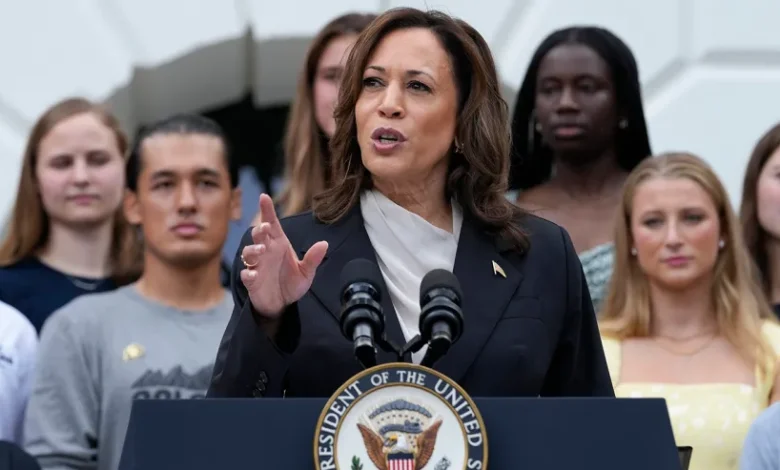Where Kamala Harris stands on health care issues

Vice President Kamala Harris has already staked out health stances to the left of President Biden. She announced that she will run for the Democratic nomination following the latter’s decision to withdraw from the race for reelection.
However, it’s unlikely that her and President Biden’s policy preferences will diverge significantly.
In addition to being a far better messenger than Biden has been, Harris will be able to take credit for Biden’s health victories, which include a $35 insulin cap, Medicare medication price talks, and an out-of-pocket cap on Medicare drug coverage.
The Biden-Harris administration is in charge. Additionally, they have collaborated on those challenges during his presidency, according to Debbie Curtis, vice president of McDermott+ consultancy. “There is absolutely no air there.”
Harris’s positions on important health topics are as follows:
Abortion
Democrats have strong positions on abortion, but because of Biden’s nuanced opinions, he hasn’t been the most consistent voice on the subject.
Harris, on the other hand, has firmly established herself as the Democratic Party’s leading proponent of abortion rights. Following the Supreme Court’s decision to overturn Roe v. Wade, Harris travelled the nation, stopping in swing, red, and blue states to speak with women affected by abortion restrictions, providers, and advocates.
After Biden announced he was dropping out of the race, abortion rights organisations flocked to support Hillary, making her the first vice president to visit an abortion provider.
“Vice President Harris is our most effective champion and messenger on this subject in a moment when Republicans have launched a full-scale attack on our reproductive rights, an issue that will be the driving force for Democratic wins,” EMILYs List President Jessica Mackler said in a statement.
In her 2019 presidential campaign, Harris pledged to increase federal restrictions on access to abortion by mandating that states with a track record of restricting it obtain approval from the Justice Department prior to passing any new legislation pertaining to the procedure.
When she ran for California attorney general in 2010, pro-abortion organisations gave her their endorsement, and she has remained close to those groups ever since.
ObamaCare
In the 2019 Democratic primary, Harris attempted to position herself as a middle-ground candidate between progressives like Sens. Elizabeth Warren (D-Mass.) and Bernie Sanders (I-Vt.) and moderates like Biden.
In addition to supporting a number of moderate alternatives, such as a “private option” plan that would allow private insurance plans to compete with public plans in the transition to Medicare for All, she praised the Medicare for All bill that Sanders had introduced.
Her candidature was ultimately doomed by the criticism she received from other contenders for her apparent uncertainty in choosing a lane.
Experts concur that she is a strong advocate for extending ObamaCare and lowering the cost of health care for millions of Americans, a position that is expected to be crucial in the upcoming congressional health care debate in 2025.
Larry Levitt, executive vice president for health policy at KFF, a nonprofit that promotes health research, wrote in an email that while Harris’s past support for Medicare for All with a private insurance alternative is reflective of her views, “I doubt it will be a big emphasis for her in the current campaign.”
“I believe Harris will rely far more on Biden and Harris’s track record on health care than on the principles she put up during the 2019 primary. Since 2019, the political and policy landscape has undergone significant shift, according to Levitt.
Drug pricing
In terms of medicine pricing, Harris sought to go farther than Biden as a presidential contender by setting a ceiling on American prices at the lowest levels reached with other nations, such as the UK and Japan.
In 2019, Democrats largely agreed with then-President Trump that medicine prices should be lowered so that Americans wouldn’t have to pay more than those in other nations for the same medications.
Harris also supported “march-in” rights, which would enable the government to take over the patents of expensive medications created with federal funding in order to lower their costs and boost competition.
Although progressives have long maintained that the United States has the right to take such action, the Biden administration has shown little willingness to comply.
Health costs
While serving as California’s attorney general, Harris battled big insurance, hospitals, and pharmaceutical companies while concentrating on health care consolidation. She has a track record of aggressively enforcing antitrust laws to prevent businesses from increasing prices as a result of engaging in anti-competitive behaviour.
Under Harris’ direction, California and the US Department of Justice filed a civil antitrust case to prevent the $54 billion merger that would have created the largest health insurance company in the country by merging the insurers Anthem and Cigna.
Major health care companies like Quest Diagnostics and McKesson, who were the targets of whistleblower lawsuits accusing them of Medicaid fraud, also paid her multimillion-dollar settlements.
In her role as vice president, Harris has spearheaded the administration’s efforts to reduce medical debt. She declared earlier this year that medical debt may no longer appear on credit reports.
Harris declared at the time that “no one should be denied access to economic opportunity simply because they experienced a medical emergency.”
The No Surprises Act, which went into effect in July 2022 and forbids surprise billing for the majority of emergency services as well as non-emergency care performed outside of the network, is one of the other legislative initiatives to reduce medical debt.




